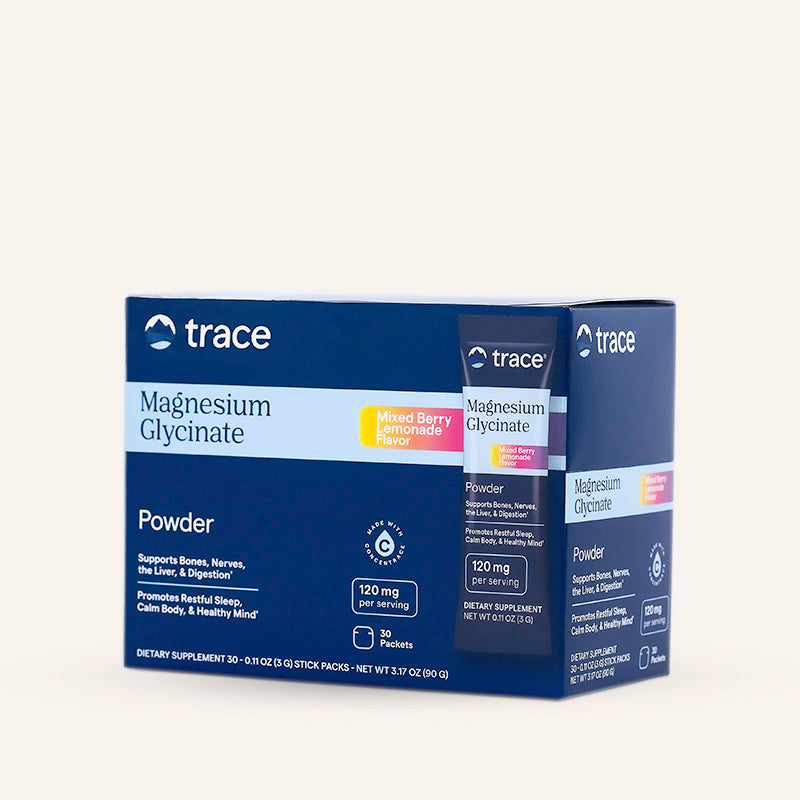Magnesium Supplements For Women
Your body relies on magnesium for hundreds of daily processes, from producing energy to calming the nervous system. Magnesium can be essential for women, supporting hormone balance, bone strength, and muscle recovery. A high-quality magnesium supplement for women can help reduce stress, improve sleep quality, and ease muscle tension while promoting long-term wellness. Pairing it with a nutrient-rich diet makes it easier to stay resilient through the demands of modern life.
Filters
Filters
How Much Magnesium Do Women Need At Every Age
Magnesium is an essential mineral that supports many fundamental processes in the body. For women, daily magnesium requirements shift through different stages of life, influenced by changes in metabolism, hormonal fluctuations, and activity levels.
According to leading health authorities, these are the estimated daily magnesium needs for women by age group:
- Teenaged Girls (14–18 Years): 360 mg per day. Adolescence is a period of rapid growth and hormonal shifts that increase the body’s demand for magnesium to support muscle function, bone development, and energy metabolism.
- Adult Women (19–30 Years): 310 mg per day. At this stage, magnesium continues to support nerve and muscle function and maintain healthy bones and metabolic activities.
- Adult Women (31 Years & Older): 320 mg per day. As metabolism gradually changes with age, magnesium supports cardiovascular health, bone density, and maintaining regular sleep patterns.
- Pregnant Women: Needs increase to around 350–360 mg per day to help meet both maternal and fetal health requirements, including supporting healthy circulation and development.
- Breastfeeding Women: 310–320 mg per day. Magnesium may help promote steady energy levels and the production of proteins necessary during lactation.
Individual needs may vary based on health status, activity level, diet, and specific life events. Many modern diets, especially those low in green leafy vegetables, whole grains, nuts, and seeds, can make it challenging to reach daily magnesium targets through food alone. For this reason, some women consider a magnesium supplement designed to provide a reliable and easily absorbable source of this crucial mineral as part of their daily wellness routine.
Signs You Might Be Low In Magnesium
Low magnesium levels can be tricky to spot, but paying attention to certain signals from your body may help. Magnesium supports hundreds of biochemical reactions, so even a modest shortfall can have far-reaching effects.
- Notice Frequent Muscle Cramps Or Twitches: Regular cramps or twitching, especially in legs or eyelids, often indicate magnesium deficiency. This mineral regulates muscle contraction and nerve signals so that low levels can disrupt smooth movement and recovery after activity.
- Recognize Persistent Fatigue & Low Energy: Even after restful sleep, ongoing fatigue may signal inadequate magnesium. Because magnesium is central to ATP production, a shortfall limits the body’s ability to generate and sustain energy, leaving you feeling drained throughout the day.
- Identify Trouble With Sleep And Relaxation: Difficulty falling asleep, staying asleep, or waking refreshed may be linked to insufficient magnesium. This mineral supports neurotransmitters like GABA that calm the nervous system, promoting deeper, more restorative rest and balanced stress responses.
- Watch For Digestive Shifts And Appetite Loss: Nausea, reduced appetite, or subtle digestive changes can sometimes point to magnesium deficiency. Since magnesium supports enzyme function and metabolic balance, low levels can affect digestion, nutrient absorption, and overall appetite regulation.
- Pay Attention To Headaches And Migraines: Recurring headaches or migraines may relate to low magnesium, which influences vascular tone and neurotransmitter activity. Inadequate intake can heighten sensitivity to triggers, increasing frequency and intensity of head pain episodes.
- Consider Hormonal Influences In Women: Hormonal fluctuations may magnify magnesium shortfalls in women, particularly during the menstrual cycle. Adequate intake supports muscle relaxation, mood balance, and energy stability during hormonally active phases.
- Understand The Impact Of Intense Activity: Athletes and active individuals are prone to magnesium loss through sweat and muscle use. Because magnesium is vital for recovery and cellular energy, higher demands make replenishment critical to maintaining consistent strength and endurance.
- Acknowledge Food & Soil Limitations: Even balanced diets can fall short, as modern food processing and depleted soils reduce magnesium content in common foods. Supplementation may be necessary to close gaps and restore adequate mineral status.
Support your body with minerals that genuinely make a difference. At Trace Minerals, we craft formulas tested for purity, trusted for results, and designed for daily balance. If you’re seeking a magnesium supplement for women, our science-backed approach helps ease tension, strengthen bones, and sustain energy naturally. Start building resilience today.

Magnesium For PMS And Menstrual Comfort
Premenstrual syndrome (PMS) and menstrual discomfort are common experiences for many women, often involving symptoms such as mood swings, bloating, and cramps. Magnesium, an essential mineral, supports muscle relaxation and nerve function, which may help ease these monthly challenges.
Magnesium’s Role In Symptom Relief
Scientific research suggests adequate magnesium intake may help the body manage PMS-related symptoms. Studies indicate that magnesium’s involvement in neurotransmitter regulation can support balanced mood, while its role in muscle function may promote relaxation and comfort during the menstrual cycle. For some women, maintaining healthy magnesium levels has the potential to contribute to reduced irritability and less physical discomfort around menstruation.
The Importance Of Replenishment
Since the body cannot produce magnesium, and several factors can increase its depletion during the menstrual cycle, regular replenishment through diet and supplementation can be especially helpful. Including a magnesium supplement for women in a daily routine may provide an additional source of this critical mineral, supporting comfort and overall well-being during the menstrual period.
The Role Of Magnesium During Pregnancy And Breastfeeding
Magnesium is vital to women’s health, particularly during pregnancy and breastfeeding. As an essential mineral, magnesium supports hundreds of biochemical processes in the body, including those critical for maternal and fetal wellness. During pregnancy, magnesium needs naturally increase as it assists with energy production, DNA synthesis, and developing a healthy nervous system in the growing baby. Research suggests that adequate magnesium intake may help support normal muscle function and contribute to relaxation, which is essential for expectant mothers.
Importance Of Magnesium During Breastfeeding
Magnesium continues to play a supportive role during breastfeeding. The mineral in breast milk is essential for the infant’s developing bones and metabolism. For mothers, maintaining sufficient magnesium levels can help with energy metabolism and may aid in combating fatigue often associated with breastfeeding. Additionally, magnesium supports a balanced mood, an important consideration during the postpartum period.
Daily Intake For Long-Term Support
Because the body does not store magnesium in large amounts, daily intake, whether from dietary sources or a magnesium supplement for women, remains essential, especially during these demanding stages of life. Consistent intake may support healthy muscle and nerve function, aid in energy production, and help promote overall well-being for both mother and child.
Magnesium Needs In Perimenopause And Menopause
Perimenopause and menopause mark significant changes in a woman's body, driven by shifting hormone levels and evolving nutritional requirements. During these stages, magnesium intake becomes especially important. Research suggests magnesium may play a role in supporting relaxation, promoting healthy sleep patterns, and maintaining bone strength, three aspects of health commonly impacted during this period.
Impact Of Hormonal Fluctuations On Health
Hormonal fluctuations can influence everything from mood to metabolism. As estrogen levels decrease, the body may become more susceptible to changes in bone density, occasional muscle cramps, and sleep disturbances. Magnesium helps support biochemical processes that regulate these systems, contributing to muscle function, energy production, and a sense of calm.
Challenges Of Meeting Magnesium Needs Through Diet
Dietary surveys show that many women do not meet the recommended magnesium intake through food alone, especially in midlife. Because the body does not produce magnesium on its own and loses it through daily activities, particularly sweating, exercise, and stress, ensuring a consistent and reliable source of magnesium becomes a practical part of daily wellness routines for women in this stage of life.
Supplementation As A Supportive Strategy
Supplementing with a magnesium supplement for women may help fill in dietary gaps when food sources aren’t enough, providing additional support for bone, sleep, and metabolic wellness as the body’s needs shift. Magnesium’s role in promoting normal muscle contraction and supporting nerve transmission offers further benefits to women navigating the changes of perimenopause and menopause.
Assessing Magnesium Status: Tests And Limitations
Tracking magnesium levels in the body isn’t always as clear-cut as it might seem. Several methods exist to assess magnesium status on paper, each helpful and offering sometimes incomplete information.
- Understand The Limits Of Serum Magnesium: Serum magnesium tests are widely used and accessible, but reflect less than 1% of total body magnesium. Because most magnesium is stored in bone and muscle, serum levels may appear normal even when overall stores are depleted.
- Consider The Role Of RBC Magnesium: Red blood cell (RBC) magnesium tests provide a closer look at intracellular levels, yet results may fluctuate with recent diet or individual variations. While more informative than serum alone, RBC magnesium tests cannot always capture long-term magnesium status.
- Evaluate 24-Hour Urinary Magnesium Excretion: This test measures how much magnesium the body eliminates over a full day, offering insight into retention and loss. However, hydration status, kidney function, and short-term food choices can significantly skew results, limiting their reliability.
- Acknowledge The Body’s Tight Regulation: The body maintains blood magnesium within a narrow range, often pulling from bones and tissues to compensate. This masking effect makes lab values look acceptable even when tissue stores are inadequate, complicating accurate deficiency detection.
- Recognize Symptoms Alongside Lab Data: Fatigue, cramps, headaches, or mood changes may signal a deficiency even if tests appear normal. Pairing symptoms with dietary reviews and lab values creates a fuller, more accurate picture of magnesium needs and overall mineral balance.
- Account For Women’s Unique Needs: Hormonal fluctuations, stress, and lifestyle factors often make women more vulnerable to masked deficiencies. Evaluating magnesium status in women may require greater attention to symptoms and nutrition, not just lab results, to capture real-world needs.
Read also:
- What Type Of Magnesium Should I Take For Maximum Benefits?
- Magnesium And Mental Health: Natural Support For Mood, Sleep, And Stress
- Is Magnesium Glycinate the Best Form of Magnesium for You?
Sources:
- Kirkland, A. E., Sarlo, G. L., & Holton, K. F. (2018). The Role of Magnesium in Neurological Disorders. Nutrients, 10(6), 730. https://doi.org/10.3390/nu10060730
- Fathizadeh, N., Ebrahimi, E., Valiani, M., Tavakoli, N., & Yar, M. H. (2010). Evaluating the effect of magnesium and magnesium plus vitamin B6 supplement on the severity of premenstrual syndrome. Iranian journal of nursing and midwifery research, 15(Suppl 1), 401–405.
- Arab, A., Rafie, N., Amani, R., & Shirani, F. (2023). The Role of Magnesium in Sleep Health: a Systematic Review of Available Literature. Biological trace element research, 201(1), 121–128. https://doi.org/10.1007/s12011-022-03162-1
Frequently Asked Questions
Magnesium supplements are dietary products designed to provide the body with magnesium, an essential mineral. They come in various forms, including powders, capsules, and tablets. Magnesium is vital in supporting muscle function, energy metabolism, nerve health, and maintaining a balanced electrolyte environment within the body.
Magnesium supports multiple aspects of women’s health. It is central to muscle activity, energy production, and healthy nerve function. Adequate magnesium intake may support relaxation, promote a healthy stress response, and contribute to bone health, especially important for women as they age. Magnesium also supports normal heart rhythm and metabolic health.
Magnesium supplements are generally considered safe for most women when taken as directed. It’s always recommended to consult with a healthcare professional before starting any supplement, especially for those who are pregnant, nursing, or have underlying health conditions.
Magnesium may support relief from some symptoms associated with premenstrual syndrome (PMS), such as muscle tension, mood fluctuations, and occasional discomfort. Research suggests that adequate magnesium intake may promote relaxation and support healthy muscle function during the menstrual cycle.
Magnesium is involved in more than 300 biochemical reactions in the body, including those that support mood and bone health. While it won’t replace hormone therapies, research suggests magnesium intake may support relaxation, promote bone strength, and help ease certain discomforts experienced during menopause.
The recommended daily allowance (RDA) for magnesium varies by age and life stage. Adult women typically require between 310 and 320 mg of magnesium daily, though pregnancy and lactation may increase this need. Individual requirements may differ, making it essential to consult a healthcare provider about personalized supplementation.











